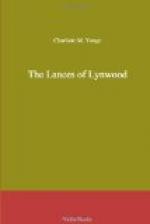“For that matter, my Lord,” said an old farmer, “if all tales be true, Master Arthur is like to learn less harm with Sir Eustace than in your jolly household—I for one will stand by our good Lord’s brother to the last. What say you, comrades?”
“Hurrah for the Lances of Lynwood!” shouted John Ingram, and the cry was taken up by many a gruff honest voice, till the hall rang again, and the opposing shout of “a Clarenham, a Clarenham!” was raised by the retainers of the Baron. Eustace, at the same moment, raised his nephew in his arms, and lifted him up into the embrasure of one of the high windows. Sir Philip Ashton still hung upon Clarenham, pleading in broken sentences which were lost in the uproar: “Hold! Hold! my Lord. Nay, nay, think but”—(here he was thrust roughly aside by Fulk)—“Sir Eustace, do but hear—it will be a matter for the council—in the name of the King—for the love of Heaven—Leonard, son Leonard! for Heaven’s sake what have you to do with the matter? Down with that sword, and follow me! Dost not hear, froward boy? Our names will be called in question! Leonard, on your duty—Ha! have a care! there!”
These last words were broken short, as Gaston, rushing forwards to his master’s side, overthrew the table, which carried Sir Philip with it in the fall, and he lay prostrate under the boards, a stumbling-block to a stream of eager combatants, who one after another dashed against him, fell, and either rose again, or remained kicking and struggling with each other.
After several minutes’ confused fighting, the tumult cleared away, as it were, leaving the principals on each side opposite to each other, and as the fortune of the day rested on their conflict, all became gradually fixed in attention, resting upon their weapons, in readiness at any moment to renew their own portion of the combat.
Fulk, tall and robust, had far more the appearance of strength than his slenderly-made antagonist, but three years in the school of chivalry had not been wasted by Eustace, and the sword of Du Guesclin was in a hand well accustomed to its use. Old Ralph was uttering under his breath ecstatic exclamations: “Ha! Well struck! A rare foil—a perfect hit—Have a care—Ah! there comes my old blow—That is right—Old Sir Henry’s master-stroke— There—one of your new French backstrokes—but it told—Oh! have a care—The Saints guard— Ay—There—Follow it up! Hurrah for Lynwood!” as Fulk tottered, slipped, sank on one knee, and receiving a severe blow on the head with the back of the sword, measured his length on the ground.
“Hurrah for Lynwood!” re-echoed through the hall, but Eustace cut short the clamour at once, by saying, “Peace, my friends, and thanks! Sir Fulk de Clarenham,” he added, as his fallen foe moved, and began to raise himself, “you have received a lesson, by which I hope you will profit. Leave the house, whose mourning you have insulted, and thank your relationship that I forbear to bring this outrage to the notice of the King.”




